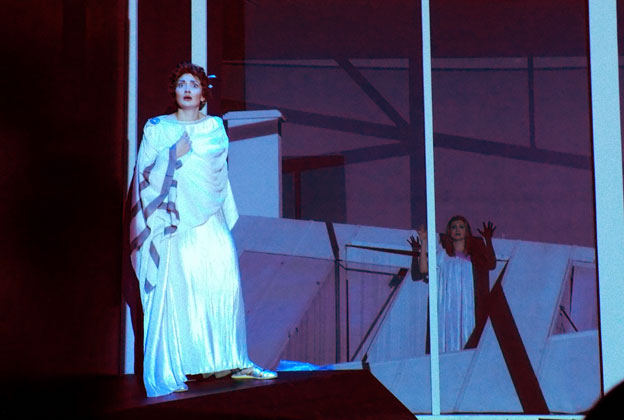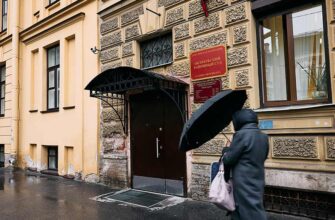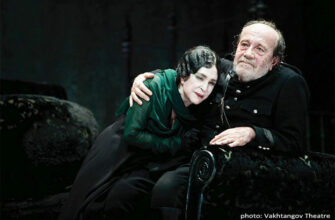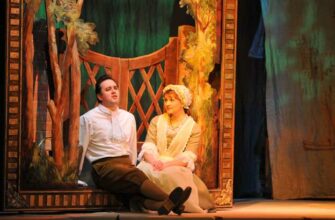A chamber theatre of Boris Pokrovsky has offered its viewers a new vision of an Opera by C. W. Gluck revised by G. Berlioz in French. It the idea of a Musical Director of the theatre, a national artist of the USSR G. N. Rozhdestvensky to reconstruct the Opera. There are many modern elements in the production, and the image of Cupid is in the foreground.
Christoph Willibald Gluck (Christoph Willibald Ritter von Gluck, 1714-1787) was a German composer, a representative of classicism. A theatrical performance (azioneteatrale) “Orpheus and Eurydice”, created in Vienna in 1762, was the result of collaboration between an Italian poet and playwright R. Calzabigi and a choreographer Angiolini, G. and ushered in a new era in the European theater, as it reformed Opera Seria. The war between supporters of tradition and reform resulted in a confrontation “glucitol and piccinists”.
Hector Berlioz (Louis Hector Berlioz, 1803-1869) – a French composer, representative of romanticism. An atheist and an opponent of the Bourbon dynasty who orchestrated “La Marseillaise”, he had innovative musical and aesthetic views. Gluck was one of the ideals of the composer, Berlioz devoted musicological articles to his operas. An ppera “Orpheus and Eurydice” by C. W. Gluck was edited with minimal interference in the text of the author. The edition of the opera was made for Pauline Viardot, Turgenev’s muse and the prototype of the heroine of the “Consuelo” novel by J. Sand. The performance with participation of the singer had a huge success.
In the I century BC, a Roman poet Virgil (Publius Vergilius Maro) wrote his “Georgics” (γεωργεῖν) poetry, which was a practical guide for agriculture. In the fourth book, devoted to beekeeping, he wrote about bees and their habits, and also about the religious cults and legends associated with them. That was how a poetic image of a singer Orpheus appeared, who twice lost his wife, Eurydice. When running away from Aristeya, she died from a snake bite. The bees of Aristey suffered from the fact their owner was guilty of her death. Although Orpheus managed to pull his wife from the realm of the dead, the lost her again at the exit from the underworld, and he was torn by the Thracian priestesses, as he got into Bacchanalia. Having made a sacrifice to the gods, Aristeus cured his bees.
Though it retains the drama of the plot, the opera by C. W. Gluck makes it much lighter. An agreement of Orpheus was not with the realm of the dead, but with the gods, who sent him Eros (Cupid) and promised to resurrect beloved, if he brings her from the underworld and never look back. Although Orpheus looked back, unable to bear the reproaches of his wife, the gods took pity on him again and resurrected Eurydice. The action ends with a feast in the Palace of Eros.
A modern production of the Pokrovsky theatre made by the artistic Director of the theatre M. Kislyarov retains the dynamics of the story, continues the course for a happy ending and meets the needs of Cupid (Eros). A charming Cupid, whose voice is full of love, looks like a playful student of the present day. Eurydice has got traits of a frivolous woman, the choice of which identified the suffering of her husband. A party of Orpheus sounds the most dramatic, and it traditionally performed in contralto, and that is why he looks lonely and even distracted from the action.
The music of Gluck sounding in a modern way and devoid of Baroque decorations, has a vocal setting that is familiar to the modern audience, and the scenery is designed with the use of modern technology. All this, of course, approaches the story to the modern viewer. We believe that all fans of the art innovations will be interested in seeing “Orpheus and Eurydice” at the Pokrovsky theatre, which confirmed again its glory of a brave experimenter. The actors are entirely absorbed by their roles and play professionally and expressively. And, of course, the music of Gluck’s beautiful.
In response on a question of “E Vesti” about what inspired him to make this production, M. Kislyarov said: “First and foremost, I was inspired by music, which led even my imagination. It is music that told about what is right and what is not. Honestly, this version came at the moment when I was working on a completely different version. I left everything and focused on it. It is you who will judge if it’s right or wrong. From my point of view, it is correct musically”.
Opera can be seen on December, 17, 18, 20, 21 and 22, 2016. In addition, there is a gallery of portraits of Pauline Viardot in the theatre lobby, devoted to the memory of the singer.





